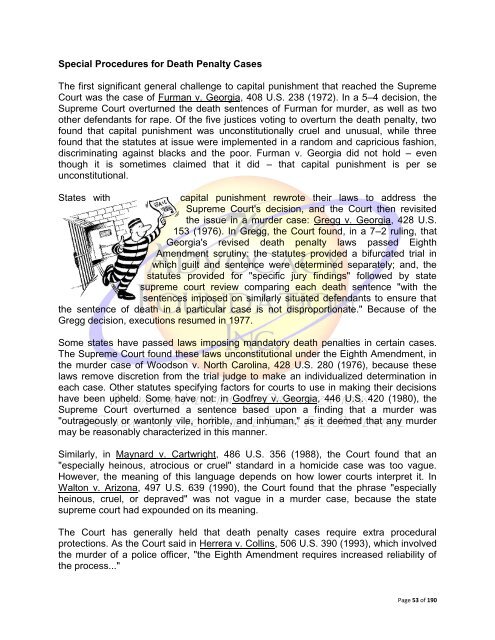The Violent Crime and Law Enforcement Act of 1994
The Violent Crime and Law Enforcement Act of 1994
The Violent Crime and Law Enforcement Act of 1994
Create successful ePaper yourself
Turn your PDF publications into a flip-book with our unique Google optimized e-Paper software.
Special Procedures for Death Penalty Cases<br />
<strong>The</strong> first significant general challenge to capital punishment that reached the Supreme<br />
Court was the case <strong>of</strong> Furman v. Georgia, 408 U.S. 238 (1972). In a 5–4 decision, the<br />
Supreme Court overturned the death sentences <strong>of</strong> Furman for murder, as well as two<br />
other defendants for rape. Of the five justices voting to overturn the death penalty, two<br />
found that capital punishment was unconstitutionally cruel <strong>and</strong> unusual, while three<br />
found that the statutes at issue were implemented in a r<strong>and</strong>om <strong>and</strong> capricious fashion,<br />
discriminating against blacks <strong>and</strong> the poor. Furman v. Georgia did not hold – even<br />
though it is sometimes claimed that it did – that capital punishment is per se<br />
unconstitutional.<br />
States with<br />
capital punishment rewrote their laws to address the<br />
Supreme Court's decision, <strong>and</strong> the Court then revisited<br />
the issue in a murder case: Gregg v. Georgia, 428 U.S.<br />
153 (1976). In Gregg, the Court found, in a 7–2 ruling, that<br />
Georgia's revised death penalty laws passed Eighth<br />
Amendment scrutiny: the statutes provided a bifurcated trial in<br />
which guilt <strong>and</strong> sentence were determined separately; <strong>and</strong>, the<br />
statutes provided for "specific jury findings" followed by state<br />
supreme court review comparing each death sentence "with the<br />
sentences imposed on similarly situated defendants to ensure that<br />
the sentence <strong>of</strong> death in a particular case is not disproportionate." Because <strong>of</strong> the<br />
Gregg decision, executions resumed in 1977.<br />
Some states have passed laws imposing m<strong>and</strong>atory death penalties in certain cases.<br />
<strong>The</strong> Supreme Court found these laws unconstitutional under the Eighth Amendment, in<br />
the murder case <strong>of</strong> Woodson v. North Carolina, 428 U.S. 280 (1976), because these<br />
laws remove discretion from the trial judge to make an individualized determination in<br />
each case. Other statutes specifying factors for courts to use in making their decisions<br />
have been upheld. Some have not: in Godfrey v. Georgia, 446 U.S. 420 (1980), the<br />
Supreme Court overturned a sentence based upon a finding that a murder was<br />
"outrageously or wantonly vile, horrible, <strong>and</strong> inhuman," as it deemed that any murder<br />
may be reasonably characterized in this manner.<br />
Similarly, in Maynard v. Cartwright, 486 U.S. 356 (1988), the Court found that an<br />
"especially heinous, atrocious or cruel" st<strong>and</strong>ard in a homicide case was too vague.<br />
However, the meaning <strong>of</strong> this language depends on how lower courts interpret it. In<br />
Walton v. Arizona, 497 U.S. 639 (1990), the Court found that the phrase "especially<br />
heinous, cruel, or depraved" was not vague in a murder case, because the state<br />
supreme court had expounded on its meaning.<br />
<strong>The</strong> Court has generally held that death penalty cases require extra procedural<br />
protections. As the Court said in Herrera v. Collins, 506 U.S. 390 (1993), which involved<br />
the murder <strong>of</strong> a police <strong>of</strong>ficer, "the Eighth Amendment requires increased reliability <strong>of</strong><br />
the process..."<br />
Page 53 <strong>of</strong> 190
















